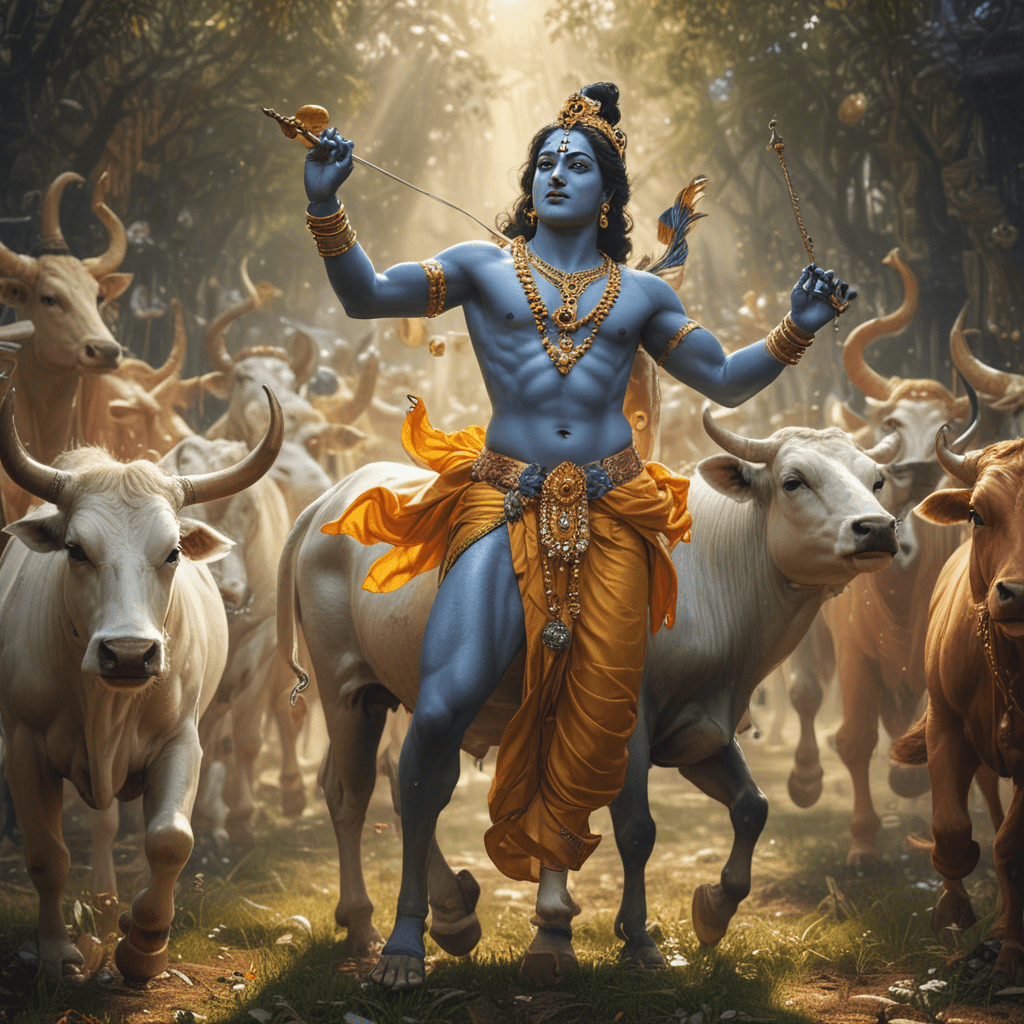The Myth of Krishna: The Divine Cowherd
Krishna, one of the most revered and beloved deities in the Hindu pantheon, has captured the imaginations of countless devotees for centuries. His mythical tales, filled with divine power, profound wisdom, and endearing charm, have shaped Indian culture and spirituality.
The Birth of Krishna: A Divine Incarnation
According to legend, Krishna incarnated on Earth in the Dwapara Yuga, an era marked by moral decline. He was born as the eighth son of Devaki and Vasudeva, a devout couple unjustly imprisoned by the tyrant King Kamsa. As a prophecy foretold that Devaki's eighth child would be Kamsa's downfall, the king ordered the newborn Krishna to be killed. However, divine intervention saved the infant, who was secretly whisked away to the safety of the humble village of Gokul.
Krishna's Childhood: The Divine Cowherd
In Gokul, Krishna spent his formative years as a cowherd, frolicking amidst the lush pastures and befriending the local gopis, or milkmaids. Known for his mischievous pranks and endearing charm, Krishna became the beloved playmate of his cowherd companions. His divine powers, as well as his ability to protect and provide for the villagers, gradually became evident. He performed miraculous feats, such as lifting the Govardhan hill to shield his friends from Indra's wrath.
The Killing of the Demon Kamsa: Triumph over Evil
As Krishna grew older, King Kamsa's fear of the divine child intensified. He sent numerous demons to kill Krishna, but all were defeated with ease. Finally, Kamsa himself confronted Krishna in a fierce battle. Despite Kamsa's immense strength, Krishna ultimately triumphed, fulfilling the prophecy and liberating the people of Mathura from the tyrant's reign.
Krishna's Role in the Mahabharata: Wisdom and Divine Guidance
Krishna played a pivotal role in the epic Mahabharata, a tale of war and dharma. As the mentor and charioteer of Arjuna, one of the Pandava brothers, Krishna imparted profound wisdom through the Bhagavad Gita, a sacred scripture that became a cornerstone of Hindu philosophy. His teachings guided Arjuna through the complexities of life and duty, emphasizing selflessness, detachment, and the importance of fulfilling one's dharma.
Krishna's Teachings: The Bhagavad Gita and the Essence of Hinduism
The Bhagavad Gita, delivered by Krishna on the battlefield of Kurukshetra, is considered one of Hinduism's most sacred texts. It encompasses the essence of Hindu philosophy, delving into themes such as karma, dharma, the nature of reality, and the path to liberation (moksha). Krishna's teachings emphasized the importance of righteous action, selfless devotion, and ultimately, the realization of one's true nature as a divine soul.
Krishna's Departure from Earth: The Return to the Divine
After fulfilling his mission on Earth, Krishna returned to his divine abode, leaving behind a legacy of love, wisdom, and spiritual inspiration. His departure marked the end of the Dwapara Yuga and the beginning of the Kali Yuga, the present era. However, Krishna promised his devotees that he would return whenever dharma declined and evil prevailed.
Conclusion: Krishna's Impact on Human Consciousness
Krishna's myth has left an enduring impact on human consciousness, transcending religious and cultural boundaries. His teachings continue to guide and inspire millions, providing insights into the nature of reality, the purpose of life, and the path to spiritual enlightenment. Krishna's story serves as a reminder of the power of divine love, the importance of selfless action, and the ultimate triumph of good over evil.
Frequently Asked Questions
1. Who is Krishna?
Krishna is one of the most revered deities in the Hindu pantheon, known for his divine power, wisdom, and charm.
2. Why is Krishna called the Divine Cowherd?
Krishna spent his childhood tending cattle and playing with the gopis in the village of Gokul.
3. What is the significance of the Bhagavad Gita?
The Bhagavad Gita is a sacred scripture that contains Krishna's teachings on dharma, karma, and the nature of reality.
4. Why did Krishna leave Earth?
Krishna returned to his divine abode after fulfilling his mission, promising to return whenever dharma declines and evil prevails.
5. How can Krishna's teachings be applied to daily life?
Krishna's teachings emphasize the importance of selfless action, devotion, and the pursuit of spiritual enlightenment, which can be applied to various aspects of daily life.




